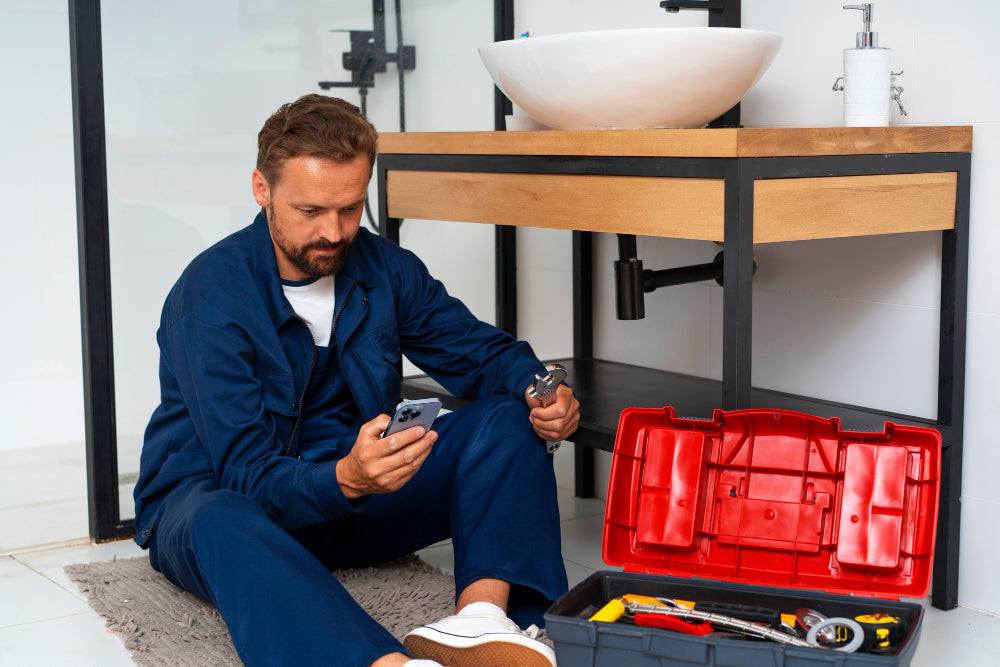
Why Plumbers Should Care About Data Security in Inspection Footage?
Share
Inspection cameras are used daily by plumbers. And that is why they should pay close attention to maintain integrity and protect the inspection footage. This indicates the significance of data security in plumbing works.
Apart from fixing leaks, information management has nowadays become a key consideration in home inspection plumbing. This shows why plumbers must care about proper storage of data.
Technology has shown its magic in the plumbing field. The introduction of the video inspection system in modern plumbing has resulted in an accurate diagnosis of sewage issues, such as leaks, clogs, and corrosion. This lowers the job stress of a plumber, along with ensuring better results.
There are around 132,000 plumbing businesses in the USA. Hence, data security should be a priority in the plumbing inspection checklist to ensure that vital information is stored properly. Well, data security is often ignored by many plumbers, and that leads to reputational damage. This blog evaluates why plumbers must care about data security in inspection footage.
Plumbing Inspection Footage and the Reason Behind Its Sensitivity
Plumbing inspection footage refers to the video that is captured by plumbers using specialized cameras during sewage drain inspection. Using top-quality cameras in home plumbing inspections helps to obtain HD images. An inspection footage has details on private properties, the drainage system, and existing defects.
Cameras can be of various types, like push cameras, sewer cameras, robotic crawlers, etc. These are applicable in different instances, all the while making inspections more convenient. The obtained footage from the cameras must be stored securely for future use.
Plumbing inspection footage is sensitive because it possesses personal and private information about a property. Also, the internal condition of the plumbing system of a house is revealed. It is the duty of the plumbers to ensure that the obtained footage is secured.
What Are the Main Data Security Risks in Plumbing Footage?
A house plumbing inspection can result in a range of security risks. Hence, a plumber must acknowledge the prerequisites to ensure proper security. Here are different data security risks that are pertinent in plumbing footage.
Data Loss
There is a high chance of data theft if you share footage without encryption. A permanent data loss can happen if you do not have a proper daily backup. This hampers the reputation of a plumber, and there might be a need for re-inspection. And it is not always possible to win the trust of the clients if you lose it once.
Unauthorized Access
Do you store footage on unsecured devices or cloud systems? This is not right because it accounts for the risk of unauthorized access. Often, plumbers use poor cloud systems, and this brings security risks. Investing in secured equipment results in offering a high level of client satisfaction.
Internal Threats
There are several real instances where trusted individuals leak footage intentionally. This is a clear case of sabotage, which can be done by employees or contractors. Hence, you must give access only to the trusted individuals.
Liability Issues
What might happen if customer footage is leaked during a plumber inspection? Well, your client will get offended. This leads to potential lawsuits, and you might have to deal with legal troubles.
Here is a comparative evaluation of common data risks in plumbing operations.
|
Risks |
Description |
Impact on Business |
|
Lost equipment |
Loss or theft of cameras |
Medium to High (depending on content) |
|
Unencrypted storage |
Footage stored on unprotected SD card |
High (full data loss) |
|
Sharing of unsecured links |
Sending footage via open links |
High (convenient to misuse) |
Table: Common Data Risks in Plumbing
What Are the Legal Responsibilities of a Plumber?
Plumbing works might result in legal consequences. This puts a plumber in legal trouble, which is not always easy to handle. A plumber needs to install, maintain, and repair plumbing systems while following the necessary plumbing codes and regulations.
Plumbers are legally responsible for securing inspection footage. This is because of the involvement of client property. Well, this also goes with their work ethic. Your client will feel dissatisfied if you cannot store the inspection data properly.
In the USA, there is no single privacy law that is followed in the entire country. Well, there are state-specific privacy laws. For example, the California Consumer Privacy Act (CCPA) in California ensures that the residents have rights over their personal data. A plumber needs to follow it while storing inspection footage.
What Are the Best Ways to Store Plumbing Inspection Footage?
If you are engaged in a bathroom plumbing inspection, you need to be well-equipped with tools so that inspection footage can be stored securely. Let’s check out some best practices to protect plumbing inspection footage.
Using Password-Protected Devices and Securing Cloud Storage
To ensure a high level of professionalism, plumbers must give preference to data security. Here, using password-protected devices is important so that no one can get access to the stored information.
Prioritizing secure cloud storage helps to retrieve data even if it gets deleted from the actual device. There is a need to keep backup facilities. It’s better to incorporate a consistent backup routine.
Using Encrypted Video Inspection Systems
To prevent unauthorized access and secure sensitive information, a plumber needs to rely on an encrypted video inspection system. This helps you maintain privacy while inspecting a private property. While purchasing a drain inspection camera, you need to choose one with secure storage.
It falls under the duty of the plumbers to ensure the confidentiality of the gathered inspection footage. This makes you win the client’s trust while gaining more employment opportunities.
Getting Client Consent Before Inspection
Home plumbing inspections result in gathering sensitive information about a private property. Hence, a plumber needs to obtain the consent of the clients before recording. The client must also be notified that you are storing the footage for a long time.
Offering Proper Training to the Technicians
Do you lead a plumbing team? Are they trained on data security? Well, you need to offer them adequate training on how to store inspection footage safely. This refrains a plumbing company from any legal consequences, along with maintaining its reputation.
How Securing Inspection Footage Benefits Plumbing Businesses?
House plumbing inspection involves a set of responsibilities because you handle sensitive client data. Well, creating a perfect data security infrastructure is advantageous for a business. Plumbers are highly trusted when they value the privacy of their clients. This helps to generate more businesses.
When you are legally responsible for storing inspection footage, there is no point in taking it lightly. Securing inspection footage helps a company to improve its brand image, along with lowering liability.
Final Thoughts
Plumbers need to prioritize data security because inspection footage contains confidential information that must not be revealed to outsiders. Any data leak incidents hamper the relationship between plumbers and clients. Some of the common risks are data loss, unauthorised access, etc. You need to use a secure system to store information safely.
Planning to Secure Inspection Footage
Are you planning to emphasise data security? This is important in maintaining a high level of professionalism while satisfying the customers. Visit our website to learn about a range of plumbing systems for data security. Choose the one that fits well with your work.
Frequently Asked Questions
1. How Can I Restrict Outsiders From Viewing the Inspection Footage?
You need to rely on firewalls and access control systems to put restrictions on who can access the inspection footage.
2. How Often Do Plumbers Need to Inspect Their Plumbing Systems?
You need to inspect your system once a year.
3. How Can I Add an Extra Security Layer to Inspection Footage?
To add an extra layer of security to inspection footage, you can consider two-factor authentication.
4. Should I Opt for Data Minimization?
Yes. Try to collect and store information that is vital for inspection. You must avoid collecting too much confidential information because it might increase data security risk.
